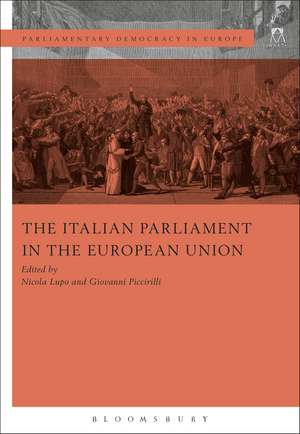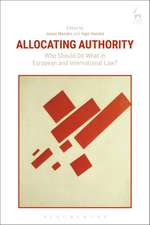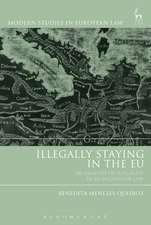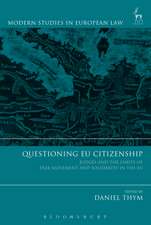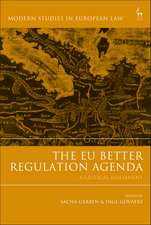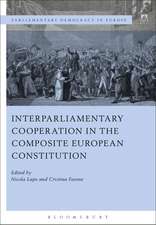The Italian Parliament in the European Union: Parliamentary Democracy in Europe
Editat de Professor Nicola Lupo, Giovanni Piccirillien Limba Engleză Paperback – 19 feb 2020
| Toate formatele și edițiile | Preț | Express |
|---|---|---|
| Paperback (1) | 242.72 lei 6-8 săpt. | |
| Bloomsbury Publishing – 19 feb 2020 | 242.72 lei 6-8 săpt. | |
| Hardback (1) | 544.88 lei 6-8 săpt. | |
| Bloomsbury Publishing – 4 oct 2017 | 544.88 lei 6-8 săpt. |
Preț: 242.72 lei
Preț vechi: 308.33 lei
-21% Nou
Puncte Express: 364
Preț estimativ în valută:
46.45€ • 48.59$ • 38.58£
46.45€ • 48.59$ • 38.58£
Carte tipărită la comandă
Livrare economică 03-17 aprilie
Preluare comenzi: 021 569.72.76
Specificații
ISBN-13: 9781509936670
ISBN-10: 150993667X
Pagini: 384
Dimensiuni: 169 x 244 x 21 mm
Greutate: 0.61 kg
Editura: Bloomsbury Publishing
Colecția Hart Publishing
Seria Parliamentary Democracy in Europe
Locul publicării:London, United Kingdom
ISBN-10: 150993667X
Pagini: 384
Dimensiuni: 169 x 244 x 21 mm
Greutate: 0.61 kg
Editura: Bloomsbury Publishing
Colecția Hart Publishing
Seria Parliamentary Democracy in Europe
Locul publicării:London, United Kingdom
Caracteristici
The collection offers a comprehensive understanding of the new role of parliamentary bodies in the new constitutional framework of the EU.
Notă biografică
Nicola Lupo is Professor of Public Law at LUISS Guido Carli University of Rome.Giovanni Piccirilli is Assistant Professor of Constitutional Law at LUISS Guido Carli University of Rome.
Cuprins
Introduction: The Italian Parliament and the New Role of National Parliaments in the European Union Nicola Lupo and Giovanni Piccirilli Part I: Italy Coping with the Process of European Integration1. The Transformative Role of the Parliament in the Italian Experience Pietro Falletta2. The Role of the Italian Parliament in the Stipulation of International Treaties: Rise and Decline of the 'Authorisation Model' Giuliano Vosa3. Formulating and Implementing EU Law and Policies: 'Ascending' and 'Descending' Phases and Beyond Renato Ibrido4. The Evolution of Italian Representation in the European Parliament: Electoral Laws, Systemic Effects and MPs' Characteristics Alessandro Chiaramonte, Lorenzo De Sio and Vincenzo Emanuele Part II: The Formation of the National Position in the EU5. The Function of Scrutiny and Political Direction of the Government, Between Foreign Affairs and European Affairs Giovanni Rizzoni6. European Affairs within the Chamber of Deputies Antonio Esposito7. European Affairs within the Senate of the Republic Davide A Capuano8. The Coordination with the Regional Councils Cristina Fasone Part III: The Italian Parliament in the 'Euro-national' Parliamentary System9. Procedures vis-à-vis the Commission: The Subsidiarity Scrutiny as a Way to 'Reconnect' EU Democracy Nicola Lupo10. Procedures vis-à-vis the European Council and the Council: Approval, Delay and Veto Powers Giovanni Piccirilli11. Procedures vis-à-vis the European Parliament and the Other National Parliaments: Interparliamentary Cooperation Elena Griglio12. Procedures vis-à-vis the Court of Justice of the European Union: Ex Post Subsidiarity ScrutinyWerner Vandenbruwaene13. Procedures vis-à-vis the Institutions of the New Economic GovernanceMassimo Nardini14. Procedures vis-à-vis the 'Masters of the Treaties': The Parliamentary Role in the Revision of the Treaties Barbara Guastaferro Part IV: The Italian Future in a European Perspective15. Understanding the Impact of the Autonomy of National Legislatures on the EU Policy Process Amie Kreppel16. The Italian Symmetrical Bicameral System in EU Affairs Maria Romaniello17. The 2016 Attempted Reform of the Italian Senate in a European Perspective Luigi GiannitiConclusion: 'Silent' Constitutional Transformations: The Italian Way of Adapting to the European Union Nicola Lupo and Giovanni PiccirilliAfterword: European Democracy and National Parliaments (Through the Prism of Matteo Renzi) Peter L Lindseth
Recenzii
In addition to the fact that this volume includes up-to-date detailed analyses of the practice pursued by the Italian parliament, it is noteworthy that several of the chapters it entails refer to other Member States systems, which makes it a valuable read for scholars and practitioners interested in the Italian system but also in parliamentary participation in the EU in general.
Lupo's and Piccirilli's book gives the reader a detailed yet broad overview of the Italian Parliament's participation in the scrutiny of EU affairs. The authors' innovative concept of "Euro-national parliamentary system" permits to include a plethora of actors in the analysis of the Europeanisation process. The reader can easily grasp the complexity of parliamentary participation in EU affairs.
The book is well-structured and builds on clear aims. Political scientists and law scholars can find theoretical argumentations, analyses of formal powers, empirical data and other information, which can prove to be very important pieces to boost a fruitful interdisciplinary research agenda on representative assemblies and the EU.
... the numerous articles of the book, excellently written by several scholars and parliamentary officers, successfully show the evolution, features, and problematic aspects of the Italian Parliament within the European framework ... Lupo and Piccirilli's book deserves a special credit for remembering that, after all, Member States' Parliaments still represent the highest expression of popular sovereignty within the European Union; their ability to influence the EU decision-making processes is necessary to the democratic legitimation of the EU itself.
Lupo's and Piccirilli's book gives the reader a detailed yet broad overview of the Italian Parliament's participation in the scrutiny of EU affairs. The authors' innovative concept of "Euro-national parliamentary system" permits to include a plethora of actors in the analysis of the Europeanisation process. The reader can easily grasp the complexity of parliamentary participation in EU affairs.
The book is well-structured and builds on clear aims. Political scientists and law scholars can find theoretical argumentations, analyses of formal powers, empirical data and other information, which can prove to be very important pieces to boost a fruitful interdisciplinary research agenda on representative assemblies and the EU.
... the numerous articles of the book, excellently written by several scholars and parliamentary officers, successfully show the evolution, features, and problematic aspects of the Italian Parliament within the European framework ... Lupo and Piccirilli's book deserves a special credit for remembering that, after all, Member States' Parliaments still represent the highest expression of popular sovereignty within the European Union; their ability to influence the EU decision-making processes is necessary to the democratic legitimation of the EU itself.
